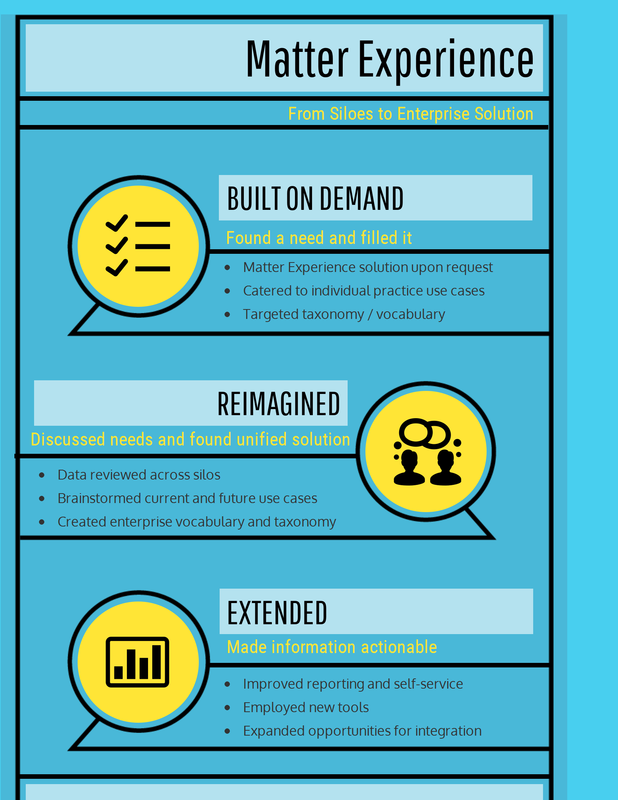Libraries were once the central research centers of law firms; places where all of the relevant materials to make or break the case where stored and used. Librarians were then seen as the custodians of the materials and the go to people to find information among the vast print resources housed there. With the move to digitized, searchable content available from any computer, anywhere, anytime what is to become of the information experts? They need to evolve beyond the walls of the space. Breaking the tie is critical; redefinition of the professional, key.
Librarians are one of the only professions where the very title and definition of that title are tied to a physical space. Merriam-Webster’s dictionary defines a library as “a place in which literary, musical, artistic or reference materials (as books, manuscripts, recordings or films) are kept for use but not for sale” and a librarian as “a specialist in the care or management of a library.” We are so much more and the time has come to redefine ourselves as information specialists, able to locate, assimilate, and summarize large volumes of digital and print information into actionable results.
The first step in the evolutionary process is admitting that the change is needed. Sitting complacently by while first year associates use Google to find the answers to complex legal problems or failing to provide proactive information to practice groups looking to expand will mean our demise. We need to get out in front of the information tidal wave and establish the value we bring to the firm. We have been trained to rely upon reputable sources to find the needle in the haystack, quickly and cost effectively. Our knowledge goes beyond legal content where our skills can be applied to a variety of subjects and disciplines, adding value for client teams, administrative groups, and project teams. We need to make sure everyone at our firms know what our services are and how they are evolving with the addition of new resources and technology tools with which to access information. Development of a communication strategy and plan are key.
Next, the definition of our services comes into play. What do we do, for whom, and at what cost, both in time and dollars? Definition of services, service level expectations, and quality results are key to this evolution. We need clearly published service options that highlight our expertise and lead to leveraging of those services across the firm. Tying our experience to well-established services and service expectations will increase the likelihood that those services will begin to redefine our roles. Let’s change the perception of our profession from caretakers of information to purveyors of information both on demand and in anticipation of request.
We also need to redefine our service audiences. Traditionally, library research teams supported attorneys in the execution of cases and matters. While that role is still key for the research team, it should be one on many hats we wear. We should be actively involved in business development, gathering business intelligence, tracking industry trends, and clearly defining our role and contribution in RFP’s and other client facing materials. We should also be expanding our role to contribute in the areas of practice and professional development. We should be aiding practice leaders in gathering peer data, assessing the legal market, and identifying trends. We should be offering CLE accredited training courses in legal research techniques and the application of research tools to legal business problems. We should also be contributing to the efforts of our administrative teams, whether it be gathering lease costs for a potential move, gathering information on potential lateral hires, or providing background on potential vendors. Information is power for case teams, administrative teams, and management and we need to establish ourselves, once again, as the most effective avenue to that information.
Lastly, we need to strike a balance between proactive and reactive information provisioning. Gone are the days when we can rely upon our attorneys and staff to ask for information; we need to be anticipating their information needs. Identification of these information needs is difficult, but doable. We need to be aware of regular practice management, firm management, project team and other meetings and the goals of those meetings. Once we know our audiences and their objectives, we can begin to develop reports that help facilitate decision making by those groups. If we know our firms want to grow internationally, we can provide management with legal market data in those potential markets and lists of competitive firms. If we know we are starting a multidisciplinary practice to support clean energy, we can provide the working group with information to support the effort. Being aware the business direction the firm is taking sets us up for successful contribution to those efforts.
Bringing it all together cohesively and effectively is key to our evolution. Let’s redefine librarians as “information specialists who facilitate access to information anywhere, anytime, and in any format, leveraging that information to provide research results to direct inquiries and in proactive support of their organizational goals and objectives.” Let’s once again become the go-to information resource for our entire firms, breaking free of the four walls that once defined our libraries and our profession.



